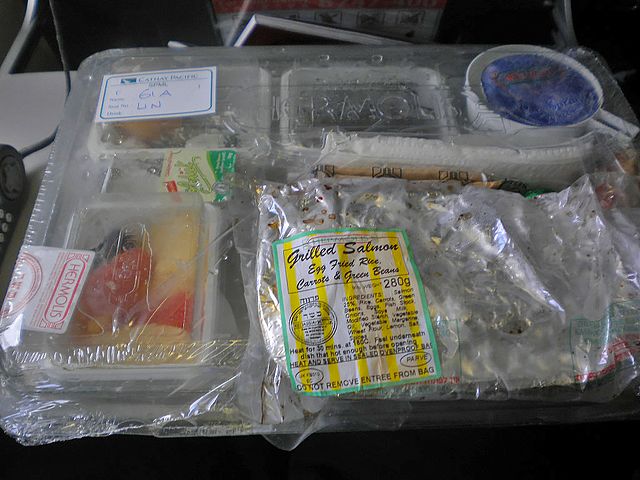Kosher airline meal
Meal served to airline passengers that follows Jewish dietary laws From Wikipedia, the free encyclopedia
A kosher airline meal is an airline meal that conforms to the standards of kashrut. Many airlines offer the option of kosher meals to passengers if ordered in advance. These not only contain food that is kosher, but also other features to aid observant Jews, such as copies of Tefilat HaDerech (the Traveler's Prayer) and prayers that are recited before and after eating and bread on which the mezonot blessing is recited, thereby enabling observant Jews to consume the bread without washing hands.

"Kosher" is one of several options for special meals offered to air travelers.[1] Similarly styled meals that are packaged in double wrapping with verifiable kashrut certification are offered in a variety of other settings, such as cruise ships, hospitals, or catered events.[2] The double wrapping allows for the meals to be heated in a non-kosher oven.[3]
On airlines, kosher meals are the most commonly requested special meal.[4] Kosher meals have become popular even among non-Jewish passengers who perceive kosher foods to be cleaner and healthier. As they cost approximately twice as much as standard meals, airlines may charge more for them.[5]
History

Kosher airline meals started appearing as an option in the 1960s for Orthodox Jewish travelers.[6]
Issues
Airlines have sometimes been subject to criticism due to their failure to provide kosher meals. In January 2022, American Airlines was fined R$16,000 for failing to serve kosher meals on several flights.[7] In February 2025, Air France provided a family with a meal which was labeled as kosher despite not being kosher.[8]
Cost

Kosher meals cost the airline nearly twice as much as standard meals, even as they are offered at no additional cost to the traveler.[5] Smithsonian Magazine has reported that kosher airline meals are the most expensive type of airline meal served.[9]
Kashrut issues
Sometimes, dairy and meat foods are mixed by airline employees unaware of the kashrut guideline prohibiting such mixtures, or dairy is served too soon after a meat meal.[10]
On Passover, meals containing chametz (bread which has leavened beyond 18 minutes) are sometimes served by mistake.[3]
See also
References
External links
Wikiwand - on
Seamless Wikipedia browsing. On steroids.
